Why You Should Invest In Sustainability Education
Sustainable business management practices are growing in demand from both end-consumers and regulatory bodies. Take one of the largest contributors to global plastic usage as an example: the recyclable packaging materials market is forecast to grow by 7% every year to $440 billion by 2025.1 This growth trend is driven predominantly by environmentally-conscious consumer demand.
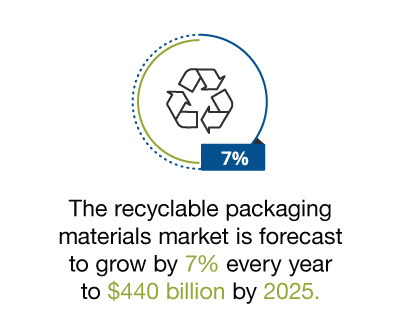
But it’s not only consumers pushing for green practices and sustainable trade. The UN’s 2015 Sustainable Development Goals (SDGs), part of their sustainable development agenda, call businesses and individuals to strive for sustainability at all times.2 State entities are also banning the use of non-recyclable materials that fill up landfills such as plastic bags and disposable cups.3
Sustainability trends for 2018
With all these players pushing for sustainability in business, all sectors and industries are going to be affected by the rising green practice demands. Here are a few sustainability trends predicted to pick up momentum in 2018:
Carbon reduction | The World Bank has committed to cease funding new oil and gas exploration by 2019, with French multinational insurance company AXA and Dutch multinational bank ING adding their voices to the call.4 |
Plastics and ocean pollution | Microbeads have been banned in the UK as of January 2018, and a wave of activism seemingly spurred on by the release of BBC’s Blue Planet 2 has seen a huge public outcry against the use of disposable coffee cups.5 |
The UN Sustainable Development Goals (SDGs) | Companies will increasingly need to understand the UN’s sustainable development agenda and prove how their strategies and activities align with the goals and specific milestones. |
Sustainability reporting | The Global Reporting Initiative made the move from guidance to standards in 2016, meaning companies using the standards will need to make sure their reporting behaviour meets the requirements.6 |
Carbon reduction |
| The World Bank has committed to cease funding new oil and gas exploration by 2019, with French multinational insurance company AXA and Dutch multinational bank ING adding their voices to the call.4 |
Plastics and ocean pollution |
| Microbeads have been banned in the UK as of January 2018, and a wave of activism seemingly spurred on by the release of BBC’s Blue Planet 2 has seen a huge public outcry against the use of disposable coffee cups.5 |
The UN Sustainable Development Goals (SDGs) |
| Companies will increasingly need to understand the UN’s sustainable development agenda, and prove how their strategies and activities align with the goals and specific milestones. |
Sustainability reporting |
| The Global Reporting Initiative made the move from guidance to standards in 2016, meaning companies using the standards will need to make sure their reporting behaviour meets the requirements.6 |
The impact of sustainability trends
While the world has always been an ever-changing place, the economic and business norms of the past are going to be forced to change in the face of a new wave of sustainability trends.
Knowing this, business leaders at all levels need to incorporate sustainability into their long-term strategies, allowing them to not only adapt to the changing business context but to use it as a competitive advantage. But this competitive advantage will only last if leaders act quickly.
Research at Tufts’ Fletcher School found including sustainable practices into your business strategy will help you:7
- Mitigate business risk by negating potential disruption of operations or supplies
- Conform to industry standards of transparency, traceability and environmental responsibility
- Establish a foothold with prospective customers and increase share in current markets
- Build goodwill with key stakeholders
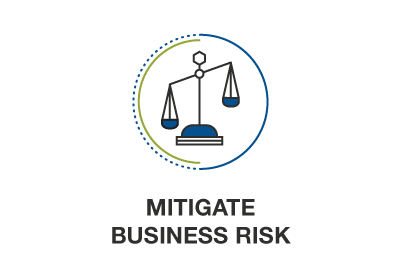
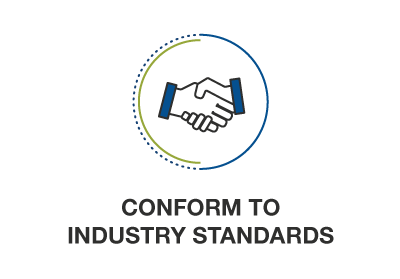
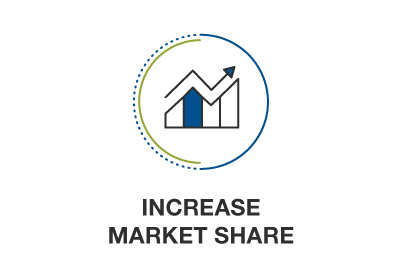
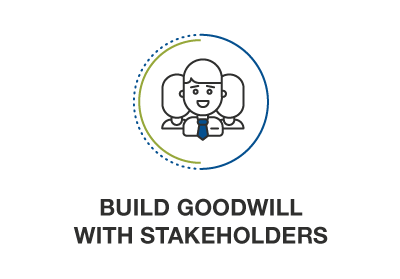
![]() Reshaping the global sustainability landscape
Reshaping the global sustainability landscape
Recognising the need for increased efforts in sustainable practices, the University of Cambridge Institute for Sustainability Leadership (CISL) has developed a ten-year plan to lay the groundwork for a sustainable economy and future.8
Based on the demands of the UN’s Sustainable Development Goals, CISL’s Rewiring the Economy project aims to bring together three key parts of the economy – namely business, government, and finance – to act in achieving six sustainability ambitions through ten tasks.
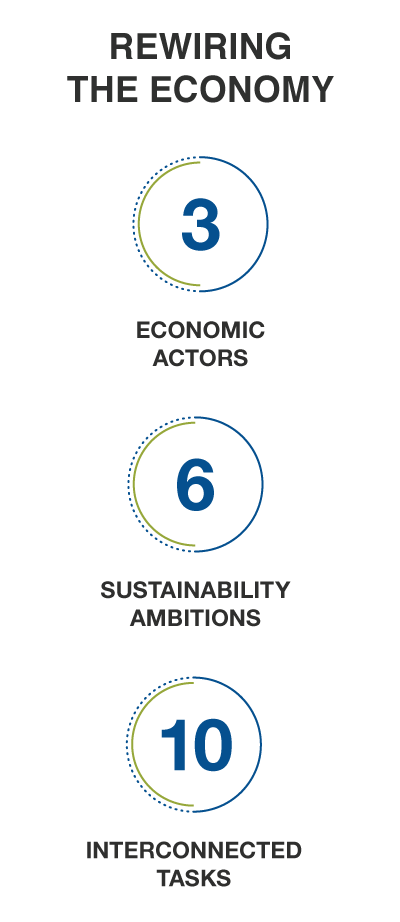
In these efforts, CISL recognises the importance of sustainability education as a tool for change, to be used to help them realise the change they envision.
Through CISL’s executive education programmes and courses, senior leaders are provided with insight into innovative, commercially-compelling methods of addressing global trends, building the leadership capacity and skills to generate action and create substantial change.
While the leaders of companies are the best equipped to create change, it’s vital to ensure all workers are empowered to make sustainable change. Educating entire workforces enables businesses to incorporate sustainability into operations and planning, as opposed to merely adopting a facade of sustainable practices, or treating it as an afterthought.
Sustainability education for meaningful change
The Business Sustainability Management online short course from the University of Cambridge Institute for Sustainability Leadership is aimed at educating professionals across all levels from all over the world in order to facilitate meaningful sustainable business reform.
The eight-week course focuses on topics such as:
- Sustainability challenges and opportunities
- The regulatory environment and international policy
- Collaboration and partnerships
- Rewiring your business approach
Students not only walk away with increased sustainability expertise and a certificate from the University of Cambridge Institute for Sustainability Leadership, but also gain access to the CISL Network: An 8,000-strong community of senior leaders and practitioners who represent business, the public sector and civil society in every industry on every continent.
Offering this course entirely online allows CISL to make a larger impact than in-person classes, furthering their goal of driving positive change for the environment, the economy and, ultimately, the world.
Ready to make impactful sustainable business change?
Learn more about the CISL Business Sustainability Management online course